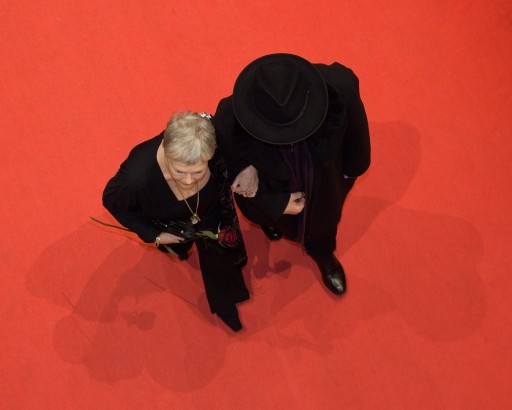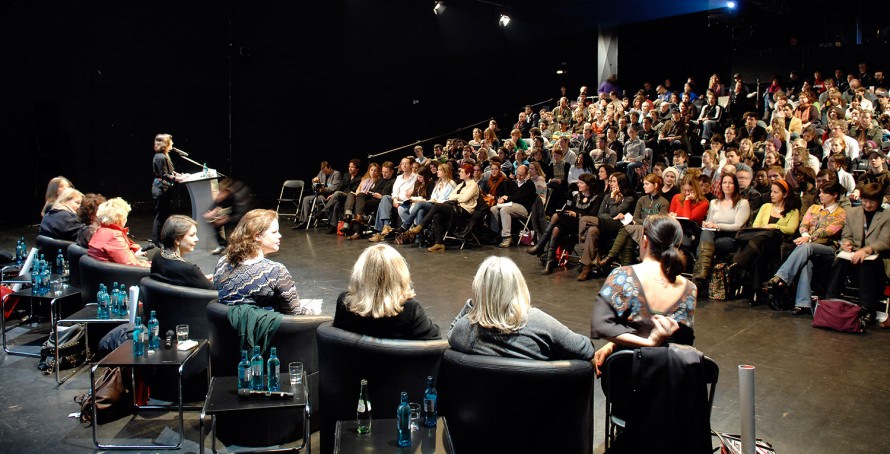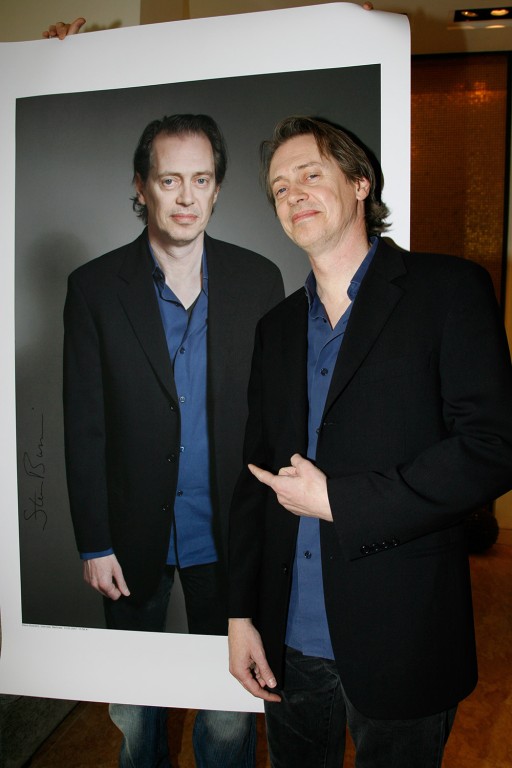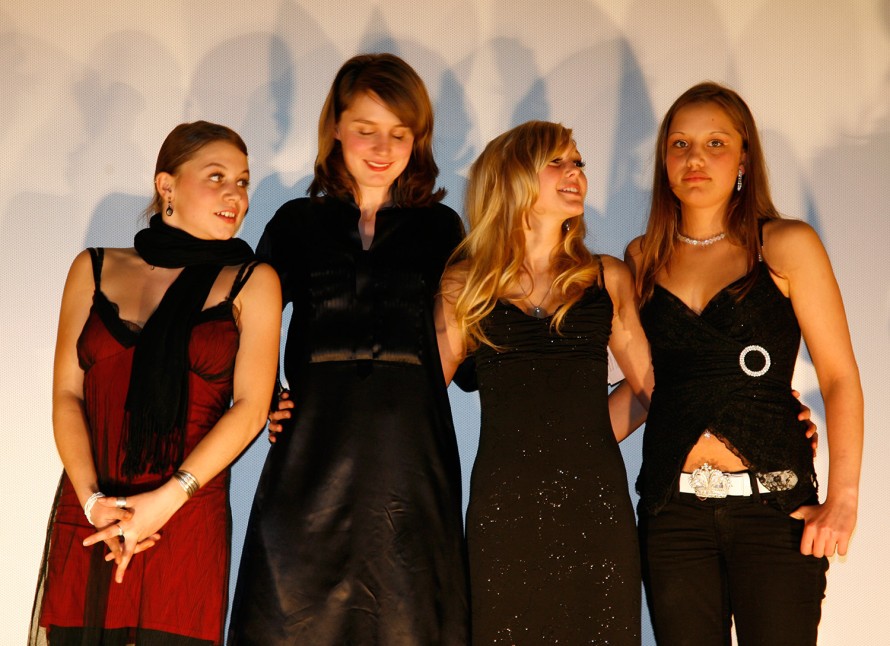2007
57th Berlin International Film Festival
February 8 – 18, 2007
"The combination of film festival and film market counts as Berlin's biggest advantage, beside its efficient infra-structure. Many buyers visit Berlin with the quite systematic goal to search for those rare to find pearls in the festival's programme sections."– Frankfurter Rundschau

Dieter Kosslick guiding Judi Dench to the Berlinale Palast.
Record interest in a Berlinale of the stars
Never before was interest in the Berlinale as great as this year, in terms of both professional visitors and the general public: More than 19,000 accredited professionals from 127 countries, including 4,000 journalists came to the festival. Over ten days, the Berlinale saw about 430,000 cinema visits, and a record 220,000 tickets were sold to the general. The newly added Cubix cinemas on Alexanderplatz were very well received. Besides the "regular sections" Competition, Panorama, Forum, Generation and Perspektive Deutsches Kino, events in the special Magnum in Motion series, the newly positioned Short Film Competition, as well as the Eat, Drink, See Movies - Culinary Cinema events were almost completely booked out.
An extra special treat came once again in the form of the Retrospective programme, which this year presented images of the “New Woman” in the era of silent film. A special pleasure for those with a taste for the unexpected were provided by the carefully restored colour versions of Hamlet (1920/21) with Asta Nielsen and Giovanni Pastrone’s historical epic Cabiria as well as the complete version of Rainer-Werner Fassbinder’s late work Berlin Alexanderplatz, which was shown as a Remastered Version in the Berlinale Special.
The Homage was dedicated to the American director Arthur Penn, who added a special touch to the Berlinale as tireless festivalgoer and gregarious guest of honour.
Side-by-side festival and market structure continues to grow dynamically
The side-by-side structure of the festival and film market continued to gain prestige and developed a new dynamic this year. The European Film Market (EFM) continued to grow qualitatively and quantitatively. In the two locations – the Martin-Gropius-Bau and the EFM Business Offices – 259 companies from the film industry from 46 countries presented themselves at 115 market stalls. In more than 1,100 screenings, 727 films were presented. The press and professional visitors unanimously concurred that the EFM has developed into a crucial date on the international business calendar. Reactions to the business activity and attractiveness of this year’s EFM couldn’t have been more enthusiastic.

Panel at the Berlinale Talent Campus in the HAU theatre.
In the informal territory between the festival and market, the Berlinale Co-Production Market further established itself as a motor for international co-productions, while the Berlinale Talent Campus secured its place as an internationally one-of-a-kind working and inspiration platform for young filmmakers from around the world. The three year-old World Cinema Fund once again used the Berlinale as a showcase for its successful film support activity: Three WCF-funded films were invited to take part in the official programme. With Ariel Rotter’s El Otro, the WCF was able to add another Bear-winner to its portfolio.
A Berlinale of the stars, especially women
The Competition films at this year’s Berlinale managed to attract a noticeable number of film stars and personalities to Berlin. The press and audiences were pleased and the Red Carpet was surrounded every day from early afternoon. At this year's festival, actresses in particular provided the memorable moments: Cate Blanchett, Marianne Faithfull, Lauren Bacall, Sharon Stone, Judi Dench, Jennifer Lopez, Emanuelle Béart, Nina Hoss, Julia Jentsch and Yu Nan, the lead actress in winning film Tuya's Marriage. Plenty of male celebrities were present too: everyone’s eyes were also on Matt Damon, Joseph Fiennes, Guillaume Dépardieu and superstar RAIN (Jung Ji-hoon) while the Jury offered plenty of "manpower" with Willem Dafoe, Gael García Bernal and Mario Adorf.
Once again the Competition presented itself as a mix of generations when it came to the directors. Young, promising names like David Mackenzie, Ariel Rotter and Li Yu drew attention alongside the greats of their trade, such as Jiri Menzel, Jacques Rivette and Paul Schrader. With Steven Soderbergh, Park Chan-wook, Francois Ozon and Christian Petzold, several big names of contemporary cinema presented their new works in Berlin.
However, not all the films in this Competition were equally popular. While Sam Gabarski’s Irina Palm, Mackenzie’s Hallam Foe, Li Yu’s Lost in Beijing and Petzold's Yella resonated positively with both the press and the general public, the eagerly awaited Bordertown disappointed many observers, because it failed to sufficiently tackle its charged topic head on – the persecution and murder of Mexican textile workers.

A double Buscemi: Steve Buscemi in the Panorama with Interview
Panorama and Forum offered diversity at a high level
With their traditionally somewhat heterogeneous profile, the Panorama and Forum were able to satisfy their demanding and passionate audiences. With Julie Delpy’s 2 Days in Paris, Hal Hartley’s Fay Grim and Sarah Polley’s Away from her, several hits were screened in the Panorama, and the section enjoyed the presence of plenty of stars: crossing the Red Carpet into the Zoo-Palast were Daniel Brühl, Danny Glover, Antonio Banderas, Steve Buscemi as well as Karl Lagerfeld and John Waters, to whom a documentary portrait was dedicated. A critic’s favourite was Pascale Ferran’s Lady Chatterley. Insider tips in the section included the political documentary Strange Culture, Mitchell Lichtenstein’s Teeth as well as the Korean Dasepo Naughty Girls, which was credited in the New York Times alongside Park Chan-wook’s Competition film I'm a Cyborg, But That's OK, for having revived the genre of the "crazy movie".
The Forum lived up to its reputation of taking a differentiated view of international film and presented various developments coming out of Asia, in particular. Highlights aslo included the re-screening of Charles’ Burnett’s 1977 social drama Killer of Sheep, Guy Maddin’s eccentric silent film Brand Upon the Brain!, which was presented as a opera spectacle, as well as two noteworthy works by young German directors: Ann-Kristin Reyels’ Hounds and Maria Speth’s Madonnas.
German films blossom in the warmth of the Berlin February sun
Nobody doubts anymore that the Berlinale has fostered the revival of German films over the last few years. Rarely has international awareness of German film been as high as it was this year. Besides the noticeable presence of German actors in international productions - Devid Striesow, Moritz Bleibtreu, Martina Gedeck, Julia Jentsch, Jasmin Tabatabai, André Hennicke – this Berlinale was appreciated as a showcase year for the "Berlin School": Maria Speth, Thomas Arslan, Angela Schanelec presented their latest films and Christian Petzold, according to the "Neue Zürcher Zeitung", managed the “great leap” with his film Yella.

Pool of Princesses: director Bettina Blümner (2nd fr.l.) with Mina, Klara and Tanutscha.
That this quality has a lasting character was ensured by a strong year in the Perspektive Deutsches Kino, which enjoyed a sensational audience hit with the tough-talking Berlin documentary Prinzessinnenbad by Bettina Blümner.
Confronted with a constantly expanding festival, some observers complained about a predictable structural overload and the loss of distinct selectivity in the programme. Others cherished the incredible energy and buzz that is released for ten days at the festival, and the opportunities that lie therein. Meanwhile, in its 30th year, the Generation section – which has no problem defining its distinct profile – again enchanted its young, discriminating audience. The fact that the section-spanning “Award for the best first film” went to a Generation film this year, namely Vanaja by Rajnesh Domalpalli, simply underscored what has long since been known to the public: Some of the festival’s most remarkable films run in the Generation section.
Facts & Figures of the Berlinale 2007
| Visitors | |
|---|---|
| Total amount of theater visits | 430,894 |
| Tickets sold | 224,181 |
| Professionals | |
| Accredited guests (press excl.) | 15,050 |
| Countries of origin | 103 |
| Press | |
| Journalists | 4,105 |
| Countries of origin | 88 |
| Screenings | |
| Number of films in the public programme | 382 |
| Total amount of screenings | 900 |
| European Film Market | |
| Film industry participants | 5,752 |
| Number of films | 727 |
| Number of screenings | 1,099 |
| EFM-Stands (Martin-Gropius-Bau & Business Offices) |
116 |
| Number of exhibitors | 259 |
| Berlinale Co-Production Market | |
| Participants | 418 |
| Countries of origin | 48 |
| Berlinale Talent Campus | |
| Participants | 370 |
| Countries of origin | 101 |